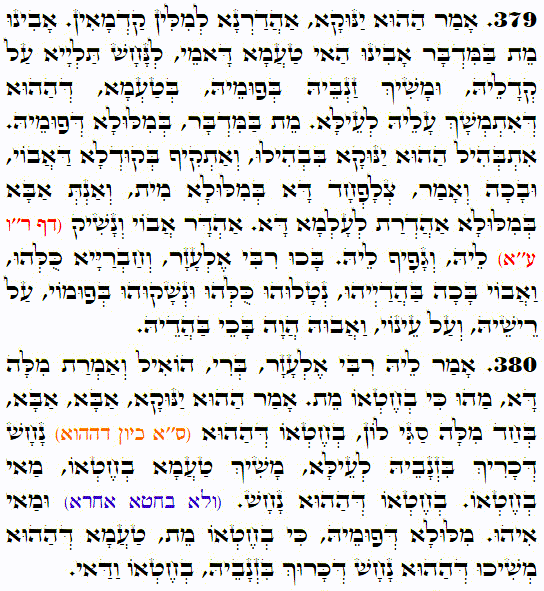Daily Zohar # 4011 – Balak – The killer snake
Daily Zohar 4011

Hebrew translation:
380. אָמַר לוֹ רַבִּי אֶלְעָזָר, בְּנִי, הוֹאִיל וְאָמַרְתָּ דָּבָר זֶה, מַה זֶּה כִּי בְחֶטְאוֹ מֵת? אָמַר אוֹתוֹ תִּינוֹק, אַבָּא אַבָּא, בְּדָבָר אֶחָד מַסְפִּיק לָהֶם, בְּחֶטְאוֹ שֶׁל אוֹתוֹ (כֵּיוָן שֶׁאוֹתוֹ) נָחָשׁ הַכָּרוּךְ בִּזְנָבוֹ לְמַעְלָה, מָשַׁךְ טַעַם בְּחֶטְאוֹ. מַה זֶּה בְּחֶטְאוֹ? בְּחֵטְא אוֹתוֹ הַנָּחָשׁ (וְלֹא בְחֵטְא אַחֵר). וּמַהוּ? דִּבּוּר פִּיו, כִּי בְחֶטְאוֹ מֵת, טַעַם אוֹתָהּ מְשִׁיכוּת שֶׁל אוֹתוֹ נָחָשׁ הַכָּרוּךְ בִּזְנָבוֹ, בְּחֶטְאוֹ וַדַּאי.
.
Zohar Balak
Continued from previous DZ
#379
The child said I’m going back to the first words, “our father died in the desert,” namely the Zarqa, which is on the word “our father.” The shape of the Zarqa resembles a snake hanging on the back of his neck and pulling its tail into his mouth. And this shape is in the style of the Zarqa drawn on top of the word “Our Father” above.
The boy rushed and held his father’s neck, cried, and said, Zelophehad died because of his words, and you, my father, returned to this world by words. The words and tears of a child. His father returned and kissed him and hugged him. Rabbi Elazar and all the friends wept, and his father wept with them. They all took him and kissed him on his mouth, his head, and eyes, and his father was crying with him.
#380
Rabbi Elazar said, my son, since you said this, please explain, what is the meaning of “He died because of his sins.” Since the snake entwined with his tail, we ask, wasn’t it enough to use one word “died,” why it is said, “died in the wilderness,” and also, why “he died in his sin.”
Since the shape of the snake with its tail wrapped around it is on the top of the word “our father”, the cantillation mark has a longer melody. It is written “in his sin”, to tell that the sin is the sin of that snake and not another sin. It is related to the words in his mouth that he spoke about Moses and pulled the force of impurity from the first Snake.
Lesson;
Speaking bad and deceiving words comes from the force of the first Snake that lied to Eve and brought mortality to the world.
We should always speak the truth, and since, in most cases, our truth is not absolute truth, we better stay quiet and avoid a connection to the impure side and the aspect of death.
Proverbs 18:21
“מָוֶת וְחַיִּים, בְּיַד-לָשׁוֹן; וְאֹהֲבֶיהָ, יֹאכַל פִּרְיָהּ”
“Death and life are in the power of the tongue, and those who love it will eat its fruits.”
Our words are produced by the heat of the heart and the vibration of air from the lungs. Both are vital to sustaining life in the body. If we use words that do not have positive aspects, then we corrupt the channel of life in the body. If we “kill” others with our sword (tongue), we actually hurt or kill life in us. In the current state of the world with many airborne viruses and diseases, it would be wise for us to keep the speech channel pure.
Rabbi Yisrael Meir Hakohen Kagan, known by the name of a book he wrote called “חפץ חיים” “Who desires life”. It is about the laws of proper speech. The book is vital for those who desire life in this world and the world to come.
The name of the book comes from Psalm 34:13
“מִי הָאִישׁ הֶחָפֵץ חַיִּים אֹהֵב יָמִים לִרְאוֹת טוֹב.”
“Who is the person who desires life And loves length of days, that he may see good?”
https://dailyzohar.com/tzadikim/76-Yisrael-Meir-HaKohen-Kagan
English book: search online stores for “Chofetz Chaim: A Daily Companion.”
Complete text online in Hebrew:
חפץ חיים WIKI
{||}

 Previous: Balak
Previous: Balak

